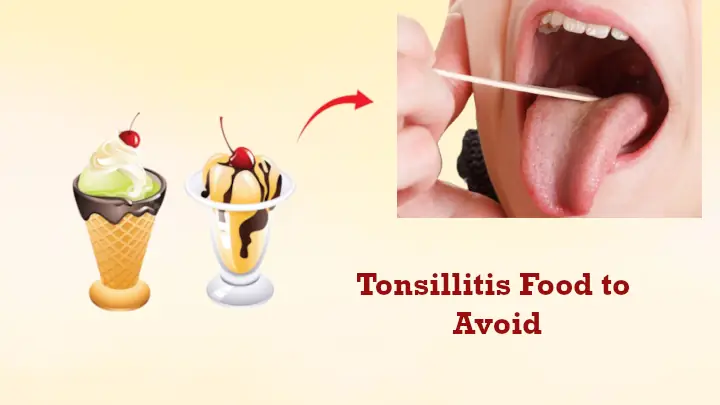Tonsillitis Food to Avoid: What food to avoid with Tonsillitis?

Are you looking for tonsillitis food to avoid? Tonsillitis is a common condition characterized by inflammation of the tonsils, which are the two oval-shaped glands in the back of the throat. It can result in symptoms including a sore throat, trouble swallowing, fever, and enlarged lymph nodes and can be caused by viral or bacterial infections.
While many foods can be beneficial in controlling the signs and symptoms of tonsillitis, some should be avoided to reduce irritation and pain.
In this post, we’ll go through the tonsillitis food to avoid and why they could worsen it. Support your body’s natural healing process and lessen the discomfort of tonsillitis by being aware of these dietary restrictions.
In This Article
Tonsillitis Food to Avoid
Let’s know here what foods make tonsillitis worse:
1. Cold Drinks
Tonsillitis individuals may find it uncomfortable to drink cold beverages like iced water. The beverage’s cold temperature has the potential to worsen pain and inflammation. Moreover, drinking cold beverages might narrow the blood vessels in the throat, impairing the body’s ability to fight off infection.
Drinks should usually be kept at room temperature or lukewarm if you have tonsillitis rather than being avoided altogether.
2. Ice Creams
If you have tonsillitis, stay away from ice cream. Ice cream’s cold temperature can cause pain and irritation, especially if you already have a sore throat. So If you have tonsillitis, staying away from cold, sweet foods like ice cream is generally advised.
3. Spicy food
Capsaicin, an ingredient in spicy foods, can irritate swollen tonsils and cause pain and discomfort. Chili peppers, hot sauce, and curry are a few examples of spicily prepared dishes.
4. Fried food
Inflammation can worsen from fried foods, which can also be challenging to swallow. Furthermore, harmful fats included in fried foods frequently cause inflammation and other health issues.
5. Dairy Products
Dairy products may raise mucus production and aggravate throat discomfort and congestion. Milk, cheese, and ice cream are some examples of dairy goods you should avoid.
6. Pickles
Pickles are one of the foods that should never be consumed if tonsillitis is present. These sour ingredients might aggravate the disease by irritating it. Also, they might be difficult to rinse off your throat, making them unsuitable for someone with tonsillitis.
7. Alcohol
Alcohol can irritate the throat and make symptoms worse. This is because alcohol can dry out the mouth and throat, increasing the risk of tonsillitis. Also, drinking alcohol makes you more likely to get the flu or another respiratory infection like a cold.
8. Carbonated Drinks
Carbonated beverages can also hurt the throat and irritate it. These drinks can also lead to bloating and gas, worsening symptoms like nausea and vomiting.
9. Processed foods
Preservatives and additives included in processed meals can worsen inflammation. These foods frequently contain excessive sugar, salt, and harmful fats, leading to various health issues.
10. Canned Foods
Foods can frequently have high sodium content, worsening symptoms and leading to dehydration. Moreover, canned foods’ preservatives and other substances are often high, which might exacerbate inflammation.
11. Sweet Foods
Sugary foods can increase inflammation and impair the body’s ability to fight against illness. Additionally, sugary meals frequently include a lot of calories and can aggravate other health issues, including weight gain and diabetes.
12. Smoking
There are various things that people can do to help prevent tonsillitis, but one of the most important things is to avoid smoking. Smoking can significantly increase your risk of developing tonsillitis, as well as other respiratory infections.
13. Citrus fruits and juices
When dealing with tonsillitis, it is advised that people avoid citrus fruits and liquids. These conditions can make it more likely that your tonsils will become infected. Moreover, citrus foods and drinks have significant acid content that might harm the tonsil cells.
Frequently Asked Questions & Answers
- Does smoking make tonsillitis worse
- Does alcohol make tonsillitis worse
- What can make tonsillitis worse
- Does coughing make tonsillitis worse
Q. Does smoking make tonsillitis worse?
Ans- Yes, smoking can make tonsillitis worse. Smoking causes throat irritation and may result in inflammation, which makes it more difficult for the tonsils to fight against infection. Moreover, it can impair immunity, which makes it easier for germs or viruses to enter the tonsils.
Q. Does alcohol make tonsillitis worse?
Ans- Yes, alcohol can make tonsillitis worse. Alcohol can irritate and inflame the throat, which makes it harder for the tonsils to fight against infection. Also, it can cause the body to become exhausted and weakened, providing an easier way for germs or viruses to invade the tonsils.
Q. What can make tonsillitis worse?
Ans- Tonsillitis is an inflammation of the tonsils caused by a bacterial or viral infection. Smoking, consuming alcohol, eating foods that can irritate the throat, being exposed to allergens or irritants like dust or pollution, having a weakened immune system as a result of illness or stress, and failing to get enough rest to allow your body to heal is just a few of the things that can make tonsillitis worse.
Q. Does coughing make tonsillitis worse?
Ans- Yes, coughing can make tonsillitis worse. The body’s natural reflex is to cough up mucus or irritants to clear the airways. Coughing can irritate and inflame the tonsils repeatedly, worsening pre-existing inflammation and aggravating the illness.
Coughing can also make it uncomfortable and painful to swallow, which makes it difficult to eat or drink. It can also raise the risk of complications, including abscess formation.
Conclusion
In conclusion, paying attention on tonsillitis food to avoid is essential to prevent more irritation and discomfort. Foods that are hot, acidic, or hard might worsen swollen tonsils and aggravate symptoms.
Additionally, eating and swallowing crunchy or hard foods might be painful or uncomfortable. You can lessen the signs and symptoms of tonsillitis and assist your body’s natural healing process by avoiding these foods and choosing softer, easier-to-swallow alternatives.
You must remain hydrated and consume enough fluids to keep the throat wet and minimize discomfort. See your health professional if you have questions about your diet or symptoms for personalized guidance and care.
Read Also: Is Strep Throat Contagious Without a Fever
References
- Chronic tonsillitis and biofilms: a brief overview of treatment
- Effect of Cold Diet and Diet at Room Temperature on Post-Tonsillectomy
- Acute Pharyngitis, Tonsillitis, and Peritonsillar Abscess





